302 scholarly books by University College London and 26
have author last names that start with M
302 scholarly books by University College London and 26
302 scholarly books by University College London
26 have author last names that start with M have author last names that start with M
26 have author last names that start with M have author last names that start with M

The India Museum Revisited
Arthur MacGregor
University College London, 2023
A full examination of the India Museum’s founding manifesto and evolving ambitions.
The museum of the East India Company formed, for a large part of the nineteenth century, one of the sights of London. In recent years, little has been remembered of it beyond its mere existence, while an assumed negative role has been widely attributed to it on the basis of its position at the heart of one of Britain’s arch-colonialist enterprises.
Extensively illustrated, The India Museum Revisited surveys the contents of its multi-faceted collections—with respect to materials, their manufacture, and original functions on the Indian sub-continent—as well as the collectors who gathered them and the manner in which they were mobilized to various ends within the museum.
From this integrated treatment of documentary and material sources, a more accurate, rounded, and nuanced picture emerges of an institution that contributed in major ways, over a period of eighty years, to the representation of India for a European audience, not only in Britain but through the museum’s involvement in the international exposition movement to audiences on the continent and beyond.
The museum of the East India Company formed, for a large part of the nineteenth century, one of the sights of London. In recent years, little has been remembered of it beyond its mere existence, while an assumed negative role has been widely attributed to it on the basis of its position at the heart of one of Britain’s arch-colonialist enterprises.
Extensively illustrated, The India Museum Revisited surveys the contents of its multi-faceted collections—with respect to materials, their manufacture, and original functions on the Indian sub-continent—as well as the collectors who gathered them and the manner in which they were mobilized to various ends within the museum.
From this integrated treatment of documentary and material sources, a more accurate, rounded, and nuanced picture emerges of an institution that contributed in major ways, over a period of eighty years, to the representation of India for a European audience, not only in Britain but through the museum’s involvement in the international exposition movement to audiences on the continent and beyond.
[more]
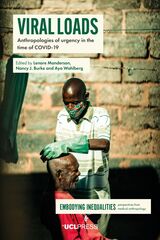
Viral Loads
Anthropologies of Urgency in the Time of COVID-19
Lenore Manderson
University College London, 2021
A diagnosis of global inequalities exploited by COVID-19 and how we might evolve.
The COVID-19 pandemic disrupted some lives more than others. While more than half the world’s population experienced physical restrictions in the wake of the virus, Viral Loads reveals how the international response placed disparate burdens on exploited communities across the globe. Contributors from six continents situate the pandemic within a highly connected yet exceedingly unequal world marked by fragmented communities, austere economies, and unstable governments. Ambitious in its scope, Viral Loads insists that medical anthropology must be part of any future efforts to build a new post-pandemic world.
The COVID-19 pandemic disrupted some lives more than others. While more than half the world’s population experienced physical restrictions in the wake of the virus, Viral Loads reveals how the international response placed disparate burdens on exploited communities across the globe. Contributors from six continents situate the pandemic within a highly connected yet exceedingly unequal world marked by fragmented communities, austere economies, and unstable governments. Ambitious in its scope, Viral Loads insists that medical anthropology must be part of any future efforts to build a new post-pandemic world.
[more]
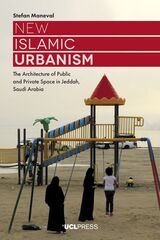
New Islamic Urbanism
The Architecture of Public and Private Space in Jeddah, Saudi Arabia
Stefan Maneval
University College London, 2019
New Islamic Urbanism traces the changing relationship between public and private space in Jeddah, Saudi Arabia, over the past seventy years, from the dawn of the oil era to the present, paying particular attention to the role architecture plays in defining public and private spaces.
Combining Michael Warner’s concepts of publics and counterpublics with theories of space and sociological approaches to architecture, Stefan Maneval explores the concept of New Islamic Urbanism in Saudi Arabia, arguing that this architectural trend, which is characterized by an emphasis on privacy protection through high enclosures, gates, blinds, and tinted windows, constitutes for some an important element of piety. At the same time, it enables different conceptions of privacy, banned social practices, as well as the formation of publics and counterpublics.
Based on rich ethnographic data collected by the author, New Islamic Urbanism challenges normative assumptions on gender segregation in Muslim societies and provides a nuanced account of the meaning of publicness and privacy in Muslim contexts in general. It will be of particular interest to an academic readership in Middle East and Islamic studies, as well as in architecture, urban planning and anthropology.
Combining Michael Warner’s concepts of publics and counterpublics with theories of space and sociological approaches to architecture, Stefan Maneval explores the concept of New Islamic Urbanism in Saudi Arabia, arguing that this architectural trend, which is characterized by an emphasis on privacy protection through high enclosures, gates, blinds, and tinted windows, constitutes for some an important element of piety. At the same time, it enables different conceptions of privacy, banned social practices, as well as the formation of publics and counterpublics.
Based on rich ethnographic data collected by the author, New Islamic Urbanism challenges normative assumptions on gender segregation in Muslim societies and provides a nuanced account of the meaning of publicness and privacy in Muslim contexts in general. It will be of particular interest to an academic readership in Middle East and Islamic studies, as well as in architecture, urban planning and anthropology.
[more]
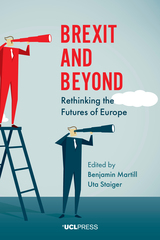
Brexit and Beyond
Rethinking the Futures of Europe
Benjamin Martill
University College London, 2018
Brexit bears serious consequences not just for Britain but for Europe and the broader balance of global order. Yet most discussions of Brexit have focused on the causes of the “Leave” vote and its implications for the future of British politics.
Drawing the discussion of Brexit beyond Britain, Benjamin Martill, Uta Staiger, and a team of twenty-eight contributors explore the consequences for Europe and the European Union. Marshaling the perspectives and methodologies of a diverse range of disciplines, the contributors chart the likely effects of Brexit on institutional relations, law, political economy, foreign affairs, democratic governance, and the idea of Europe itself. While the contributors at times offer divergent predictions for the future of Europe after Brexit, they share the conviction that careful analysis is in needed—now more than ever—if we are to understand what lies ahead.
Brexit and Beyond is the first book to focus on the broader consequences of Brexit, and its clear, comprehensive, and trenchant analysis will be invaluable to understanding the complex effects.
Drawing the discussion of Brexit beyond Britain, Benjamin Martill, Uta Staiger, and a team of twenty-eight contributors explore the consequences for Europe and the European Union. Marshaling the perspectives and methodologies of a diverse range of disciplines, the contributors chart the likely effects of Brexit on institutional relations, law, political economy, foreign affairs, democratic governance, and the idea of Europe itself. While the contributors at times offer divergent predictions for the future of Europe after Brexit, they share the conviction that careful analysis is in needed—now more than ever—if we are to understand what lies ahead.
Brexit and Beyond is the first book to focus on the broader consequences of Brexit, and its clear, comprehensive, and trenchant analysis will be invaluable to understanding the complex effects.
[more]
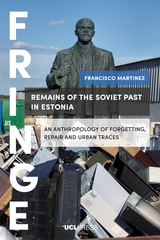
Remains of the Soviet Past in Estonia
An Anthropology of Forgetting, Repair and Urban Traces
Francisco Martinez
University College London, 2018
What happens to legacies that do not find any continuation? In Estonia, a new generation that does not remember the socialist era and is open to global influences has grown up. As a result, the impact of the Soviet memory in people's conventional values is losing its effective power, allowing for new opportunities for recuperation.
Francisco Martinez brings together a number of sites of interest to explore the vanquishing of the Soviet legacy in Estonia: a street market in Tallinn where concepts such as "market" and "employment" take on distinctly different meanings from their Western use; Linnahall, a multi-purpose venue, whose Soviet heritage now poses difficult questions of how to present the building’s history; Tallinn’s cityscape, where the social, spatial, and temporal coevolution of the city can be viewed and debated; Narva, a city that marks the border between the Russian Federation, NATO, and the European Union and represents a place of continual negotiation; and the new Estonian National Museum in Raadi, an area on the outskirts of Tartu that has avoided promoting a single narrative of the past.
By exploring these places of cultural and historical significance, which all contribute to our understanding of how the new generation in Estonia is not following the expectations and values of its predecessor, the book also demonstrates how we can understand generational change in a material sense.
Francisco Martinez brings together a number of sites of interest to explore the vanquishing of the Soviet legacy in Estonia: a street market in Tallinn where concepts such as "market" and "employment" take on distinctly different meanings from their Western use; Linnahall, a multi-purpose venue, whose Soviet heritage now poses difficult questions of how to present the building’s history; Tallinn’s cityscape, where the social, spatial, and temporal coevolution of the city can be viewed and debated; Narva, a city that marks the border between the Russian Federation, NATO, and the European Union and represents a place of continual negotiation; and the new Estonian National Museum in Raadi, an area on the outskirts of Tartu that has avoided promoting a single narrative of the past.
By exploring these places of cultural and historical significance, which all contribute to our understanding of how the new generation in Estonia is not following the expectations and values of its predecessor, the book also demonstrates how we can understand generational change in a material sense.
[more]
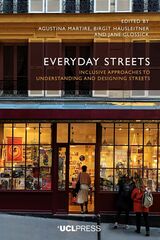
Everyday Streets
Inclusive Approaches to Understanding and Designing Streets
Agustina Martire
University College London, 2023
A comparative look at everyday streets in contemporary cities and how they could be more inclusively used.
Everyday streets are both the most used and most undervalued of cities’ public spaces. They are places of social aggregation, bringing together people of different classes, genders, ages, ethnicities, and nationalities. They comprise not just the familiar outdoor spaces that we move through and interact in but also urban blocks, interiors, depths, and hinterlands, which are integral to streets’ nature and contribute to their vitality. Everyday Streets offers an inclusive approach to understanding and designing these streets through an analysis of them as found in cities around the globe. From the regular rectilinear urban blocks of Montreal to the carefully regulated narrow alleyways of Naples, and from the resilient market streets of London to the crammed commercial streets of Chennai, the streets in this book were all conceived with a certain level of control. Everyday Streets is a palimpsest of methods, perspectives, and recommendations that together provide a solid understanding of everyday streets, their degree of inclusiveness, and to what extent they could be more inclusive.
Everyday streets are both the most used and most undervalued of cities’ public spaces. They are places of social aggregation, bringing together people of different classes, genders, ages, ethnicities, and nationalities. They comprise not just the familiar outdoor spaces that we move through and interact in but also urban blocks, interiors, depths, and hinterlands, which are integral to streets’ nature and contribute to their vitality. Everyday Streets offers an inclusive approach to understanding and designing these streets through an analysis of them as found in cities around the globe. From the regular rectilinear urban blocks of Montreal to the carefully regulated narrow alleyways of Naples, and from the resilient market streets of London to the crammed commercial streets of Chennai, the streets in this book were all conceived with a certain level of control. Everyday Streets is a palimpsest of methods, perspectives, and recommendations that together provide a solid understanding of everyday streets, their degree of inclusiveness, and to what extent they could be more inclusive.
[more]
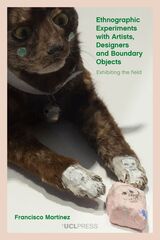
Ethnographic Experiments with Artists, Designers and Boundary Objects
Exhibiting the Field
Francisco Martínez
University College London, 2021
A lively investigation into ethnographic practice.
Richly illustrated, Ethnographic Experiments with Artists, Designers and Boundary Objects reflects on the experimental skills and practices shared by ethnographers and curators. Francisco Martínez highlights relationships between contemporary art, design, and anthropology and imagines creative ways to develop new infrastructure that supports vital interdisciplinary work. Attentive to the experimental nature of exhibitions, Martínez models a new approach to both ethnography and objecthood across disciplinary boundaries.
Richly illustrated, Ethnographic Experiments with Artists, Designers and Boundary Objects reflects on the experimental skills and practices shared by ethnographers and curators. Francisco Martínez highlights relationships between contemporary art, design, and anthropology and imagines creative ways to develop new infrastructure that supports vital interdisciplinary work. Attentive to the experimental nature of exhibitions, Martínez models a new approach to both ethnography and objecthood across disciplinary boundaries.
[more]
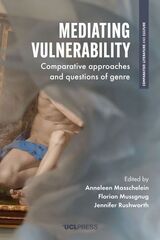
Mediating Vulnerability
Comparative Approaches and Questions of Genre
Anneleen Masschelein
University College London, 2021
Mediating Vulnerability meditates on the creative and destructive powers of vulnerability in literary form.
To experience vulnerability is to experience the tension between ruin and creativity: a vulnerable species faces extinction but also evolution, and a vulnerable person risks both irreparable harm and transformative connection. Mediating Vulnerability explores how this tension plays out across contemporary literary studies. Examining a variety of approaches to the destructive and remediating powers of genre, the authors consider how vulnerability intersects a range of representational forms including high-profile fiction by Margaret Atwood and Cormac McCarthy as well as lesser-known graphic novels, video games, television, and photography.
To experience vulnerability is to experience the tension between ruin and creativity: a vulnerable species faces extinction but also evolution, and a vulnerable person risks both irreparable harm and transformative connection. Mediating Vulnerability explores how this tension plays out across contemporary literary studies. Examining a variety of approaches to the destructive and remediating powers of genre, the authors consider how vulnerability intersects a range of representational forms including high-profile fiction by Margaret Atwood and Cormac McCarthy as well as lesser-known graphic novels, video games, television, and photography.
[more]
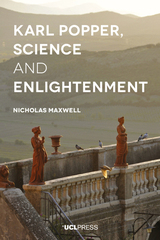
Karl Popper, Science and Enlightenment
Nicholas Maxwell
University College London, 2017
Could science, if properly understood, provide us with the methodological key to the salvation of humanity? That is a chief question coursing through the works of Karl Popper, who famously maintained that science cannot verify theories but only refute them, thereby bringing about progress. Nicholas Maxwell’s new book disputes this line of argument. By proposing a new conception of scientific methodology on disunified theories—which can be applied to all worthwhile human endeavours with problematic aims—this book calls for a new revolution in inquiry to help humanity advance towards a more civilized and enlightened world.
[more]
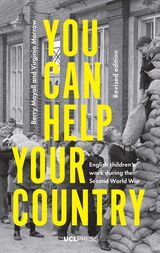
You Can Help Your Country
English Children's Work During the Second World War
Berry Mayall
University College London, 2020
As men and women throughout England were called up for war work during World War II, the country needed to generate as much food and wealth as possible to support them. Children quickly came to be seen as a vital resource. Many children worked the land, planting and harvesting crops, raising money for the war effort, and carrying out a range of other tasks. That war work followed on debates throughout the preceding decades about the character and proper activities of childhood, debates that saw commentators in education and workers' organizations arguing about whether children should stay in school and learn or should combine their education with war-related work. The work of children during the war raised a question that still has relevance today: Should children be conceptualized as citizens of the future or as participating citizens now? That debate has led to even larger questions about the social construction of childhood. As children have increasingly withdrawn from paid and unpaid work, their contribution today can best be understood through their work at school, though that work is often disguised or devalued as mere socialization. The interwar years and the war years in England were a key time for re-thinking childhood, and the issues that were raised then still have relevance to the role of children in society today.
[more]
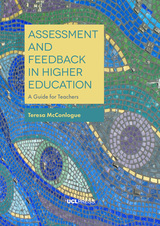
Assessment and Feedback in Higher Education
A Guide for Teachers
Teresa McConlogue
University College London, 2020
Teachers spend much of their time on assessment, yet many higher education teachers have received minimal guidance on assessment design and marking. This means assessment can often be a source of stress and frustration. Offering a concise overview of assessment theory and practice, this guide provides teachers with the help they need. In education, theory and practice are often poorly linked. In this guide, Teresa McConlogue presents theoretical ideas and research findings and links them to practice. She considers recent theoretical work on feedback and suggests ways of developing evaluative judgment. Throughout the book, teachers are encouraged to examine their practice critically, and there are ideas for small-scale educational investigations, involving teachers, their colleagues, and students, such as using the Assessment Review Questionnaire to adapt assessments. This guide explores the concept of academic standards and proposes methods of co-constructing shared standards within a teaching team and with students through calibration activities.
[more]
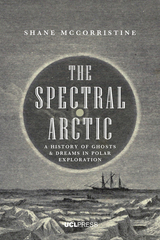
The Spectral Arctic
A History of Ghosts and Dreams in Polar Exploration
Shane McCorristine
University College London, 2018
The Arctic was long imagined as an otherworldly place, thousands of miles from the warmth and familiarity of home, and nineteenth-century Britons were fascinated by the notion of the heroic explorer voyaging through harsh terrain in pursuit of the Northwest Passage. But the mapping of this vast uncharted territory was only part of the fascination with the Arctic; Explorers and those who eagerly followed their perilous progress were also fascinated by the unknown, by the dreams and ghosts that might materialize there.
The narratives of Arctic exploration that we are all familiar with today are just the tip of the iceberg, argues Shane McCorristine, and there are a great many more mysterious stories beneath the surface. In contrast to oft-told tales of heroism and disaster, The Spectral Arctic reveals the hidden stories of dreaming and haunted explorers, of frozen mummies, of rescue balloons, visits to Inuit shamans, and of the entranced female clairvoyants who traveled to the Arctic in search of John Franklin’s lost expedition. Through new readings of archival documents, exploration narratives, and fictional texts, these stories reflect the complex ways that men and women actually thought about the Arctic in the past. This revisionist historical account also allows us to make sense of current cultural and political concerns in the Canadian Arctic about the long-lost Franklin Expedition and the recent rediscovery of the two ships.
The narratives of Arctic exploration that we are all familiar with today are just the tip of the iceberg, argues Shane McCorristine, and there are a great many more mysterious stories beneath the surface. In contrast to oft-told tales of heroism and disaster, The Spectral Arctic reveals the hidden stories of dreaming and haunted explorers, of frozen mummies, of rescue balloons, visits to Inuit shamans, and of the entranced female clairvoyants who traveled to the Arctic in search of John Franklin’s lost expedition. Through new readings of archival documents, exploration narratives, and fictional texts, these stories reflect the complex ways that men and women actually thought about the Arctic in the past. This revisionist historical account also allows us to make sense of current cultural and political concerns in the Canadian Arctic about the long-lost Franklin Expedition and the recent rediscovery of the two ships.
[more]

Brian Simon and the Struggle for Education
Gary McCulloch
University College London, 2023
The first full-length study of the life and career of Brian Simon (1915–2002), a leading Marxist intellectual and historian of education in twentieth-century Britain.
Using documentary sources that have only recently become publicly available, this book reveals the remarkably broad range of Brian Simon’s life as a student, soldier, schoolteacher, Communist Party activist, educational academic, campaigner, and reformer. In a sympathetic biography that retains critical distance, the authors analyze Simon’s contribution to Marxism and the Communist Party, explore the influence of both on his work as a historian of education, and trace the significance of his Marxist beliefs, political associations, and historical approaches to the cause of educational reform.
In so doing, they consider the full nature and limitations of Simon’s achievements in his struggle for education. Unlike many Marxist scholars, he remained loyal to the Communist Party in the 1950s, which damaged his reputation as a public intellectual. Nevertheless, his support for comprehensive education helped to promote egalitarian educational reforms in Britain, although he was later unable to provide sufficient resistance to the 1988 Education Reform Act and to a decline in the position of comprehensive schools.
In all this, the significance of Simon’s family, and especially his relationship with his wife Joan, is brought to the fore. Joan and Brian forged a formidable sixty-year partnership in politics and the Communist Party as well as in life, a partnership that lasted until Brian’s death in January 2002.
Using documentary sources that have only recently become publicly available, this book reveals the remarkably broad range of Brian Simon’s life as a student, soldier, schoolteacher, Communist Party activist, educational academic, campaigner, and reformer. In a sympathetic biography that retains critical distance, the authors analyze Simon’s contribution to Marxism and the Communist Party, explore the influence of both on his work as a historian of education, and trace the significance of his Marxist beliefs, political associations, and historical approaches to the cause of educational reform.
In so doing, they consider the full nature and limitations of Simon’s achievements in his struggle for education. Unlike many Marxist scholars, he remained loyal to the Communist Party in the 1950s, which damaged his reputation as a public intellectual. Nevertheless, his support for comprehensive education helped to promote egalitarian educational reforms in Britain, although he was later unable to provide sufficient resistance to the 1988 Education Reform Act and to a decline in the position of comprehensive schools.
In all this, the significance of Simon’s family, and especially his relationship with his wife Joan, is brought to the fore. Joan and Brian forged a formidable sixty-year partnership in politics and the Communist Party as well as in life, a partnership that lasted until Brian’s death in January 2002.
[more]
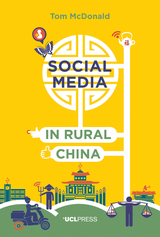
Social Media in Rural China
Social Networks and Moral Frameworks
Tom McDonald
University College London, 2016
China’s distinctive social media platforms have gained notable popularity among the nation’s vast number of internet users, but has China’s countryside been ‘left behind’ in this communication revolution? Tom McDonald spent 15 months living in a small rural Chinese community researching how the residents use social media in their daily lives. His ethnographic findings suggest that, far from being left behind, many rural Chinese people have already integrated social media into their everyday experience. Throughout his ground-breaking study, McDonald argues that social media allows rural people to extend and transform their social relationships by deepening already existing connections with friends known through their school, work or village, while also experimenting with completely new forms of relationships through online interactions with strangers, particularly when looking for love and romance. By juxtaposing these seemingly opposed relations, rural social media users are able to use these technologies to understand, capitalise on and challenge the notions of morality that underlie rural life.
[more]
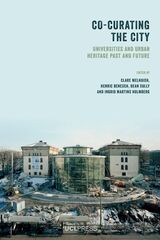
Co-Curating the City
Universities and Urban Heritage Past and Future
Clare Melhuish
University College London, 2022
A significant contribution to knowledge about university spatial development in urban contexts.
Co-Curating the City explores the role of universities in the construction and mobilization of heritage discourses in urban development and regeneration processes, with a focus on six case study sites ranging from Sweden to Brazil. The book expands the field of critical heritage studies in the urban domain, arguing that universities should position themselves as significant institutions in the development of urban heritage narratives and heavily influence urban development. The case studies investigate how universities, as mixed communities of interest dispersed across buildings and urban sites, utilize strategies of engagement with local people and neighborhoods and ask how this could contribute to a reshaping of ideas, narratives, and lived experience of urban heritage in which universities have a distinctive agency.
Co-Curating the City explores the role of universities in the construction and mobilization of heritage discourses in urban development and regeneration processes, with a focus on six case study sites ranging from Sweden to Brazil. The book expands the field of critical heritage studies in the urban domain, arguing that universities should position themselves as significant institutions in the development of urban heritage narratives and heavily influence urban development. The case studies investigate how universities, as mixed communities of interest dispersed across buildings and urban sites, utilize strategies of engagement with local people and neighborhoods and ask how this could contribute to a reshaping of ideas, narratives, and lived experience of urban heritage in which universities have a distinctive agency.
[more]
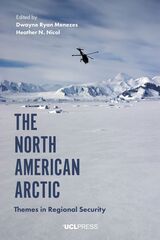
The North American Arctic
Themes in Regional Security
Dwayne Ryan Menezes
University College London, 2019
The North American Arctic focuses on current and emerging security issues confronting the Arctic that are shaping relationships between Alaska; the Canadian territories of Yukon, Nunavut, and the Northwest Territories; Greenland; and Russia. Raising important and timely questions about normative security arrangements, contributors identify the degree to which “domain awareness” has redefined traditional military focuses, while new human rights discourses have undercut traditional ways of managing sovereignty and territory. While security itself is not an outdated concept, our understanding of what constitutes human-centered security has shifted dramatically. Contributors explore this shift, looking at new regionally specific threats through the subjectivities and spaces under discussion. Providing a much-needed framework, The North American Arctic helps readers understand the impact of new developments in security in this region at both the level of community and the broader scale.
[more]
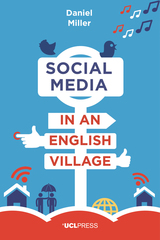
Social Media in an English Village
(Or how to keep people at just the right distance)
Daniel Miller
University College London, 2016
Daniel Miller spent 18 months undertaking an ethnographic study with the residents of an English village, tracking their use of the different social media platforms. Following his study, he argues that a focus on platforms such as Facebook, Twitter and Instagram does little to explain what we post on social media. Instead, the key to understanding how people in an English village use social media is to appreciate just how ‘English’ their usage has become. He introduces the ‘Goldilocks Strategy’: how villagers use social media to calibrate precise levels of interaction ensuring that each relationship is neither too cold nor too hot, but ‘just right’. He explores the consequences of social media for groups ranging from schoolchildren through to the patients of a hospice, and he compares these connections to more traditional forms of association such as the church and the neighbourhood. Above all, Miller finds an extraordinary clash between new social media that bridges the private and the public domains, and an English sensibility that is all about keeping these two domains separate.
[more]
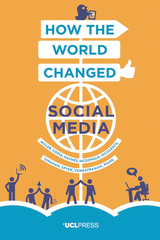
How the World Changed Social Media
Daniel Miller
University College London, 2016
How the World Changed Social Media is the first book in Why We Post, a book series that investigates the findings of anthropologists who each spent 15 months living in communities across the world. This book offers a comparative analysis summarising the results of the research and explores the impact of social media on politics and gender, education and commerce. What is the result of the increased emphasis on visual communication? Are we becoming more individual or more social? Why is public social media so conservative? Why does equality online fail to shift inequality offline? How did memes become the moral police of the internet? Supported by an introduction to the project’s academic framework and theoretical terms that help to account for the findings, the book argues that the only way to appreciate and understand something as intimate and ubiquitous as social media is to be immersed in the lives of the people who post. Only then can we discover how people all around the world have already transformed social media in such unexpected ways and assess the consequences.
[more]
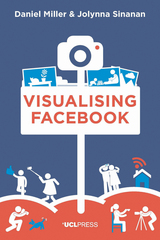
Visualising Facebook
A Comparative Perspective
Daniel Miller
University College London, 2017
Since the growth of social media, human communication has become much more visual. This book presents a scholarly analysis of the images people post on a regular basis to Facebook. By including hundreds of examples, readers can see for themselves the differences between postings from a village north of London, and those from a small town in Trinidad. Why do women respond so differently to becoming a mother in England from the way they do in Trinidad? How are values such as carnival and suburbia expressed visually? Based on an examination of over 20,000 images, the authors argue that phenomena such as selfies and memes must be analysed in their local context. The book aims to highlight the importance of visual images today in patrolling and controlling the moral values of populations, and explores the changing role of photography from that of recording and representation, to that of communication, where an image not only documents an experience but also enhances it, making the moment itself more exciting.
[more]
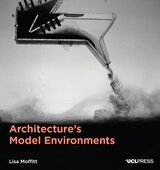
Architecture's Model Environments
Lisa Moffitt
University College London, 2023
An exploration of the architectural model as a tool for design speculation in history.
Making innovative use of the distilling lens of the architectural model, Architecture’s Model Environments is a novel and far-reaching exploration of the many dialogues buildings have with their environmental surroundings. Expanding on histories of building technology, the book sheds new light on how physical models, conventionally understood as engineering experimentation devices, enable architectural design speculation. The book begins with a catalog of ten original model prototypes—of wind tunnels, water tables, and filling boxes—and is the first of its kind to establish an architectural approach to fabricating such environmental models. Subsequent chapters feature three precedent models that have been largely overlooked within the wider oeuvres of their authors: French polymath Étienne-Jules Marey’s wind tunnels, Hungarian-American architects Victor and Aladár Olgyay’s thermoheliodon, and Scottish chemist and building ventilation expert David Boswell “The Ventilator” Reid’s test tube convection experiments. Moving between historic moments and the present day, between case studies and original prototypes, the book reveals the potent ability of models, as both physical artifacts and mental ideals, to reflect prevailing cultural views about the world and to even reshape those views.
Making innovative use of the distilling lens of the architectural model, Architecture’s Model Environments is a novel and far-reaching exploration of the many dialogues buildings have with their environmental surroundings. Expanding on histories of building technology, the book sheds new light on how physical models, conventionally understood as engineering experimentation devices, enable architectural design speculation. The book begins with a catalog of ten original model prototypes—of wind tunnels, water tables, and filling boxes—and is the first of its kind to establish an architectural approach to fabricating such environmental models. Subsequent chapters feature three precedent models that have been largely overlooked within the wider oeuvres of their authors: French polymath Étienne-Jules Marey’s wind tunnels, Hungarian-American architects Victor and Aladár Olgyay’s thermoheliodon, and Scottish chemist and building ventilation expert David Boswell “The Ventilator” Reid’s test tube convection experiments. Moving between historic moments and the present day, between case studies and original prototypes, the book reveals the potent ability of models, as both physical artifacts and mental ideals, to reflect prevailing cultural views about the world and to even reshape those views.
[more]
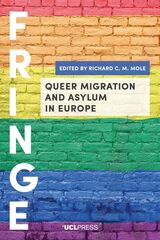
Queer Migration and Asylum in Europe
Richard C. M. Mole
University College London, 2021
A wide-ranging study on the reasons why queer individuals migrate to Europe and the sociopolitical frameworks they navigate.
Europe is a popular destination for LGBTQ people seeking to escape discrimination and persecution. Yet, while European institutions have done much to promote the legal equality of sexual minorities and a number of states pride themselves on their acceptance of sexual diversity, the image of European tolerance is often quite different from the reality faced by LGBTQ migrants and asylum seekers. Queer Migration and Asylum in Europe brings together scholars from politics, sociology, urban studies, anthropology, and law to analyze how and why queer individuals migrate to Europe, as well as the legal, social, and political frameworks they are forced to navigate in the destination societies. The subjects covered include LGBTQ Latino migrants in queer and diasporic spaces in London; the diasporic consciousness of queer Polish, Russian, and Brazilian migrants in Berlin; the role of the Council of Europe in shaping legal and policy frameworks relating to queer migration and asylum; the challenges facing bisexual asylum seekers; queer asylum and homonationalism in the Netherlands; and the role of space, faith, and LGBTQ organizations in Germany, Italy, the UK, and France in supporting queer asylum seekers.
Europe is a popular destination for LGBTQ people seeking to escape discrimination and persecution. Yet, while European institutions have done much to promote the legal equality of sexual minorities and a number of states pride themselves on their acceptance of sexual diversity, the image of European tolerance is often quite different from the reality faced by LGBTQ migrants and asylum seekers. Queer Migration and Asylum in Europe brings together scholars from politics, sociology, urban studies, anthropology, and law to analyze how and why queer individuals migrate to Europe, as well as the legal, social, and political frameworks they are forced to navigate in the destination societies. The subjects covered include LGBTQ Latino migrants in queer and diasporic spaces in London; the diasporic consciousness of queer Polish, Russian, and Brazilian migrants in Berlin; the role of the Council of Europe in shaping legal and policy frameworks relating to queer migration and asylum; the challenges facing bisexual asylum seekers; queer asylum and homonationalism in the Netherlands; and the role of space, faith, and LGBTQ organizations in Germany, Italy, the UK, and France in supporting queer asylum seekers.
[more]
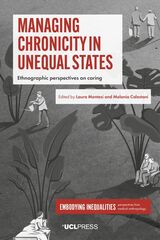
Managing Chronicity in Unequal States
Ethnographic Perspectives on Caring
Laura Montesi
University College London, 2021
Surveys how patients with chronic conditions navigate unequal healthcare systems around the world.
Managing Chronicity in Unequal States offers a global survey of how people experience chronic conditions—from Alzheimer’s patients institutionalized in the United Kingdom to homeless people with psychiatric disorders in India. Contributors explore how communities navigate stratified healthcare systems whose unspoken attitudes toward human worth negatively affect their wellbeing. Whether the state intrudes into their intimate lives or abandons them to a market-driven runaround, the authors find that people with chronic conditions must negotiate (inter)dependencies in both professional and personal relationships primarily defined by inequality.
Managing Chronicity in Unequal States offers a global survey of how people experience chronic conditions—from Alzheimer’s patients institutionalized in the United Kingdom to homeless people with psychiatric disorders in India. Contributors explore how communities navigate stratified healthcare systems whose unspoken attitudes toward human worth negatively affect their wellbeing. Whether the state intrudes into their intimate lives or abandons them to a market-driven runaround, the authors find that people with chronic conditions must negotiate (inter)dependencies in both professional and personal relationships primarily defined by inequality.
[more]

Prosperity in the Twenty-First Century
Concepts, Models and Metrics
Henrietta L. Moore
University College London, 2023
A powerful vision for reimagining prosperity for the twenty-first century.
Prosperity in the Twenty-First Century sets out a new vision for prosperity in the twenty-first century and how it can be achieved for all. The volume challenges orthodox understandings of economic models but goes beyond contemporary debates to show how social innovation drives economic value. Drawing on substantive research in the UK, Lebanon, and Kenya, it develops new concepts, frameworks, models, and metrics for prosperity across a wide range of contexts, emphasizing commonalities and differences. Departing from general propositions about post-growth to delineate pathways to prosperity, the volume emphasizes that visions of the good life are diverse and require empirical work co-designed with local communities and stakeholders to drive change. It will be essential reading for policymakers who are stuck, local government officers who need new tools, activists who wonder what is next, academics in need of refreshment, and students and people of all ages who want a way forward.
Prosperity in the Twenty-First Century sets out a new vision for prosperity in the twenty-first century and how it can be achieved for all. The volume challenges orthodox understandings of economic models but goes beyond contemporary debates to show how social innovation drives economic value. Drawing on substantive research in the UK, Lebanon, and Kenya, it develops new concepts, frameworks, models, and metrics for prosperity across a wide range of contexts, emphasizing commonalities and differences. Departing from general propositions about post-growth to delineate pathways to prosperity, the volume emphasizes that visions of the good life are diverse and require empirical work co-designed with local communities and stakeholders to drive change. It will be essential reading for policymakers who are stuck, local government officers who need new tools, activists who wonder what is next, academics in need of refreshment, and students and people of all ages who want a way forward.
[more]
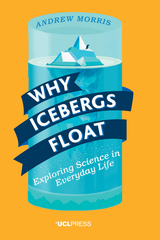
Why Icebergs Float
Exploring Science in Everyday Life
Andrew Morris
University College London, 2016
From paintings and food to illness and icebergs, science is happening everywhere. Rather than follow the path of a syllabus or textbook, Andrew Morris takes examples from the science we see every day and uses them as entry points to explain a number of fundamental scientific concepts – from understanding colour to the nature of hormones – in ways that anyone can grasp. While each chapter offers a separate story, they are linked together by their fascinating relevance to our daily lives. The topics explored in each chapter are based on hundreds of discussions the author has led with adult science learners over many years – people who came from all walks of life and had no scientific training, but had developed a burning curiosity to understand the world around them. This book encourages us to reflect on our own relationship with science and serves as an important reminder of why we should continue learning as adults.
[more]
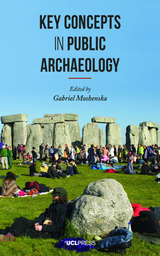
Key Concepts in Public Archaeology
Gabriel Moshenska
University College London, 2017
This book presents an overview of the key concepts in public archaeology—a field that examines the relationship between archaeology and the public—and seeks to clarify the discipline by adopting a socially and politically engaged vision. The individual chapters introduce the themes, theories, and controversies that connect archaeology to society by providing case studies that survey the trade in illicit antiquities and how digital media are used to promote public engagement with the field. Written for both students and practitioners alike, the book also will be an essential resource for pointing readers to further scholarship.
[more]
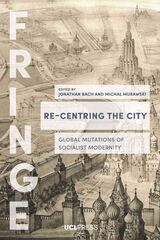
Re-Centring the City
Urban Mutations, Socialist Afterlives and the Global East
Michal Murawski
University College London, 2019
Re-Centring the City rethinks the concept of the center in studies of the urban across the social sciences and humanities. Through cases ranging from Moscow and Berlin to Mexico City, Cairo, and Chennai, the contributions explore the tension between forces of decentering and recentering as they reshape the political, economic, and social fabric of the urban and force us to reconsider the genealogy of the contemporary global city.
By drawing our attention back to the center as an object of analytical and empirical study, this book counters a long-term trend in both planning and urban scholarship that emphasizes decentralization as the hallmark of the twenty-first-century city. It argues that such a “centrifugal” turn in urban studies is neither empirically accurate nor normatively incontestable, especially when one looks beyond the West. Rather, as the contributions to this volume show, decentering obscures the ways in which the center continues to exert a powerful influence on cities of today. The concise chapters, situated at the intersection of urban studies, social anthropology, architecture, and art theory, provide new perspectives on the role of the center in defining the city’s terrain. Together, they constitute a collection of sharp, provocative interventions into debates about the transformation of global urban forms in the twenty-first century.
By drawing our attention back to the center as an object of analytical and empirical study, this book counters a long-term trend in both planning and urban scholarship that emphasizes decentralization as the hallmark of the twenty-first-century city. It argues that such a “centrifugal” turn in urban studies is neither empirically accurate nor normatively incontestable, especially when one looks beyond the West. Rather, as the contributions to this volume show, decentering obscures the ways in which the center continues to exert a powerful influence on cities of today. The concise chapters, situated at the intersection of urban studies, social anthropology, architecture, and art theory, provide new perspectives on the role of the center in defining the city’s terrain. Together, they constitute a collection of sharp, provocative interventions into debates about the transformation of global urban forms in the twenty-first century.
[more]
READERS
Browse our collection.
PUBLISHERS
See BiblioVault's publisher services.
STUDENT SERVICES
Files for college accessibility offices.
UChicago Accessibility Resources
home | accessibility | search | about | contact us
BiblioVault ® 2001 - 2024
The University of Chicago Press









